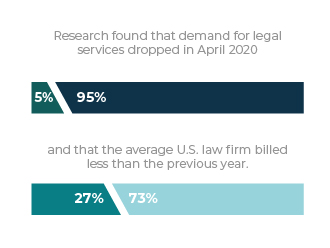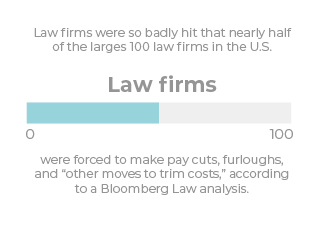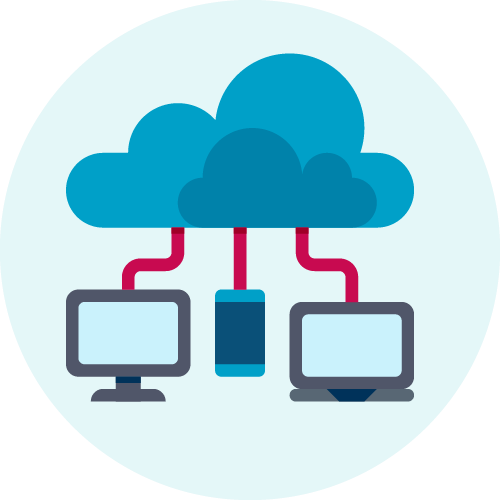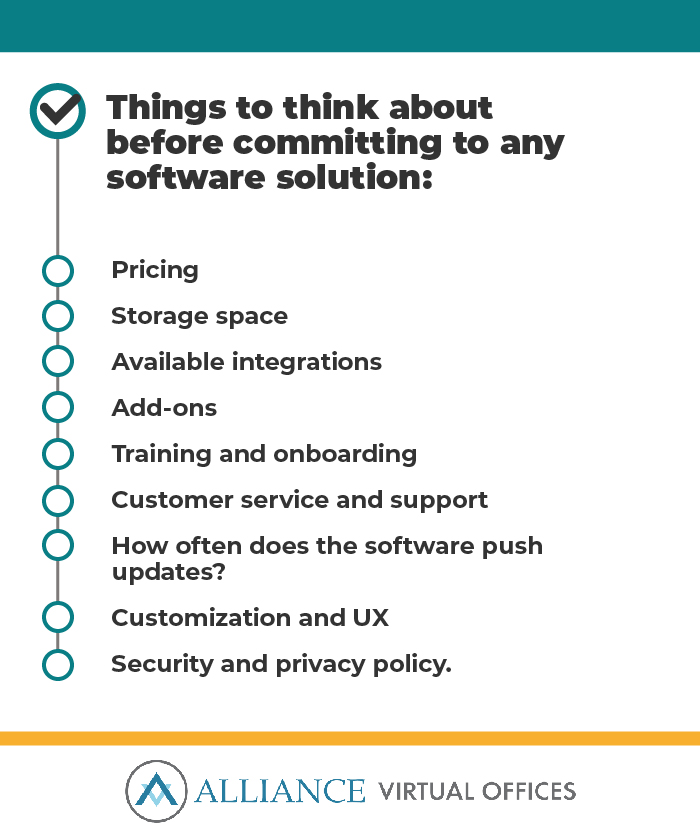- The Driving Force behind Virtual Law Firms
- How to Set up a Virtual Law Practice
- Virtual Law Office Software Checklist
Q: What is a virtual law practice?
A: A virtual law firm is a law practice that doesn’t utilize or fully rely on a traditional brick-and-mortar office. Instead, lawyers and staff members work remotely—whether from home, satellite offices, or coworking spaces—and use digital tools and platforms to communicate with each other and clients.
Legal answering services have become increasingly popular over the past couple of years as lawyers and law firms rid themselves of their brick-and-mortar and instead take advantage of new technologies to practice law virtually.
Even before the pandemic, virtual law firms were taking off; the pandemic has only accelerated the rate at which lawyers are switching from a traditional practice to a virtual platform. Why? There are many reasons, including: expensive leases, long commutes, more tech-savvy clients, and the desire for a better work-life integration.
Legal answering services are one of the key tools enabling the legal industry to successfully operate in a remote environment.
An Overview of Virtual Law Offices
Let’s start with the basics: what is a virtual or online law firm or practice?
A virtual law firm is a law practice that doesn’t utilize or fully rely on traditional brick-and-mortar offices. Instead, lawyers and staff members work remotely—whether from home, satellite offices, or coworking spaces—and use digital tools and platforms to communicate with each other and clients.
The concept of a virtual law firm is not new. Virtual law firms have existed for over 15 years; however, it wasn’t until recently that the legal industry started to truly embrace available technologies to practice law virtually.
With the onset of the coronavirus pandemic, the legal industry had little choice but to adopt new ways that lawyers could work with their clients. . As a result, there are more virtual lawyers now than ever before.
Q: What does a virtual lawyer do?
A: A virtual lawyer provides the same services as any other lawyer; the only difference is they often lack a physical office and offer legal services remotely.
It is worth noting that the legal industry is slow to change —and for good reason. Rules and regulations require law firms and lawyers to be strict about confidentiality, data protection, attorney-client privilege, and record keeping. Most law firms and lawyers have cited cybersecurity concerns as one of the main reasons they were reluctant to try out innovative technologies.
Law, like many aspects of government, is complex and rooted in tradition, history, and layers of bureaucratic jargon that make it difficult to change. The practice of law evolves slowly with time, but often remains static and is characterized by inertia.
However, while there was some incentive prior to the pandemic to make the switch to a virtual practice—increased flexibility, convenience, better work-life integration—for many lawyers, these incentives weren’t enough to convince law firms and lawyers to make the switch.
And then COVID-19 happened, and everything had to change.
Lawyers were practically forced to operate virtually anyways due to physical distancing regulations. If law firms were reluctant to try out new technologies before, they had little choice in the matter now. As it turns out, the global remote work experiment helped law firms—large and small—realize that having a virtual practice is not only convenient, but also beneficial for them and their clients.
There are various technologies and platforms out there that enable lawyers to perform their duties as effectively without a physical office. Having tried them already, many lawyers are now reluctant to go back to their traditional law practices and are instead making the full-time switch to a virtual practice.
Key Benefits of Operating a Virtual Law Practice
- Increased work flexibility.
- Lower overhead—especially in markets with high office rents.
- Greater transparency and collaboration among law firms.
- Convenience to clients.
- More flexible pricing.
It’s worth noting that lower overhead costs are a huge driver for law firms to transition to virtual, especially post-COVID.
While prior economic crises didn’t negatively impact the legal industry as much as other industries, the coronavirus pandemic was different.
Research found that demand for legal services dropped an average of 5% in April 2020 and that the average U.S. law firm billed 27% less than the previous year.
Law firms were so badly hit that nearly half of the larges 100 law firms in the U.S. were forced to make pay cuts, furloughs, and “other moves to trim costs,” according to a Bloomberg Law analysis.
This means that law firms—as companies in other industries—are in a position where they need to do more with less resources. Reducing overhead from office rent and the associated costs—utilities, printing, maintenance, toilet paper, coffee, etc.—is an effective way for companies to do more with less.
Suggested reading: Going Virtual? Making Sure Your Virtual Office is Compliant
Beyond these benefits, law firms that transition to a virtual practice are more likely to attract and retain clients in the future.
Why?
Because the future is remote.
Evolving Service Expectations
Pew Research Center and Elon University’s Imagining the Internet Center recently published the results of a survey of experts in technology, communications and social change. Here’s what they found:
“Asked to consider what life will be like in 2025 in the wake of the outbreak of the global pandemic and other crises in 2020, some 915 innovators, developers, business and policy leaders, researchers and activists responded. Their broad and nearly universal view is that people’s relationship with technology will deepen as larger segments of the population come to rely more on digital connections for work, education, health care, daily commercial transactions and essential social interactions. A number describe this as a ‘tele-everything’ world.”
Basically, what this means is that people’s and company’s expectations of services have fundamentally changed. Moving forward, individuals and companies will increasingly seek services that are powered by technology and that deliver instantly. This applies to everything: from food delivery and retail shopping to legal services and healthcare.
The research further concluded that:
“Humans’ yearning for convenience and safety fuels reliance on digital tools: The pandemic has rearranged incentives so that consumers will be more willing to seek out smart gadgets, apps and systems.”
In other words, there is no “going back to normal.” The way people live and conduct business has changed; law firms need to evolve accordingly.
The Driving Force behind Virtual Law Firms
Virtual law firms have existed for more than 15 years. However, recent technological advances have made it easier than ever for lawyers to set up a virtual law practice and to collaborate effectively with clients and colleagues.
Let’s take a closer look at some of the technologies making virtual law firms a reality.
The Cloud
The cloud has been pivotal in making the transition to remote work a seamless one; this is true of mostly all industries, including the legal one.
Why?
Because cloud-based storage enables legal documents to be neatly and securely stored. What’s more, it’s made it easier than ever for people to collaborate and share documents with one another (granted that they have access). Lawyers and interested parties can also now sign documents virtually thanks to signature applications that can be integrated with cloud-based document solutions.
One added benefit of storing legal documents in the cloud is that documents can be accessed from anywhere. Meaning, you don’t have to be in your home office to access and review important documents, even when you’re short on time.
Videoconferencing
Video conferencing apps like Zoom, Skype for Business, Go to Meeting, Google Workspace … the list goes on and on, have made it possible for the legal industry, like many other professions, to keep operating during the coronavirus pandemic.
For example, thanks to video apps, court sessions continued to take place during the COVID-19 pandemic and lawyers were able to continue meeting and onboarding clients even with physical distancing regulations still in place.
Moving forward, the legal industry will continue to lean on videoconferencing software to operate remotely and without relying as much on physical meeting space; whether it be to meet with clients, hold negotiation meetings, or talk with a judge.
Scheduling Apps
Lawyers tend to have back-to-back meetings regularly. Scheduling apps are making the transition to a remote-first law practice much seamless for lawyers and clients alike.
This type of solution makes it easy for staff and lawyers to coordinate and schedule meetings without needing to communicate in person or go back and forth by email.
Many virtual law practices have integrated scheduling apps to their website to make it easier for clients and potential clients to set up a meeting or consultation. These apps can also be integrated into email signatures, making it easier than ever for two people to find a good day and time to meet.
Virtual Answering Services
Virtual answering services have facilitated the transition to remote work for a variety of industries and professionals.
For the legal industry specifically, virtual answering services enable law firms to operate with less need for administrative assistants. This, in turn, can further reduce overhead costs associated with running a law practice.
What is an answering service?
With an answering service, companies can outsource their phone answering requirements. What this means is that your virtual answering service receives, and handles calls on behalf of your business. For law firms, this means that callers can leave messages for specific lawyers or staff members. When they don’t ask for a specific person, an answering service can direct the call to the right person to ensure that caller requests are met.
Virtual lawyers have used virtual answering services for years, which is why some virtual answering companies offer legal answering services. This type of service is specifically designed to meet the requirements of the legal industry.
Answering services are popular among solo lawyers as well as larger firms as they help reduce distractions and have the capability to answer more calls.
Virtual Offices
Virtual offices and their portfolio of services can provide remote lawyers and law firms with access to on-demand office and meeting space. It also provides them with a professional address to receive and handle mail.
Q: What are the advantages of a virtual office?
A: Virtual offices offer a variety of benefits, among the key advantages are increased flexibility, reduced overhead, and access to renowned office locations.
A virtual office is a key component of a virtual law firm as some states still require lawyers to have a physical business address. While in some cases, P.O. Box addresses will do, in some instances lawyers—like litigators—are required to have a physical address so courts can contact them.
How to Set up a Virtual Law Firm?
If you’re a lawyer and are interested in making the transition to remote work, you may be wondering how to start a virtual law firm.
The most important part of setting up a virtual law practice is to have the right setup. To ensure you have the right setup, we recommend you start by working on a solid business plan.
To figure out the right set-up for you and your staff, you need to carefully consider what everyone needs to be productive. This is a crucial step, as you do not want to invest in software and business tools that will not be necessary or effective for your team.
So, to start off, you will need to take stock of your current legal operation and ask yourself how you want to distribute your duties virtually. Will you go fully virtual, or will you keep part of your operations in traditional brick-and-mortar?
Once you have an answer to the above question, you’ll want to start considering and trying out the different software solutions available to take your law operations into the digital world. There are various options out there, so make sure you investigate each one carefully before you decide.
Once you have picked your preferred software solutions, you need to train yourself and your staff on how to use the software properly. It’s important to have clear policies and guidelines on how each platform should be used.
Virtual Law Office Software Checklist
Below is a list of basics you’ll need to get your virtual law practice up and running. Keep in mind that different law practice areas will require different tools.
Communication and Internal Collaboration Software
This type of software is particularly important for law firms that have several lawyers as part of the team. Internal communication and collaboration platforms are key to ensuring that all involved parties are able to work effectively, even asynchronously.
Most communication and collaboration tools have an option to create different channels and project pages to ensure that communication goes smoothly and to reduce potential distractions.
Cloud Storage
If you are going to work remotely, you need to have cloud storage at your disposal.
Given the nature of the legal industry, you will want to make sure that the platform you choose has strict security settings and a strong privacy policy. You will be dealing with a lot of sensitive and confidential information.
VoIP
While yes, lawyers can use their personal phones to talk with clients, a VoIP service enables lawyers to keep their personal number private. Another benefit is that a VoIP number will display a centralized number on call recipients’ screens, which portrays an image of professionalism.
Suggested reading: Top 20 VoIP Features of a Virtual Phone Plan
Legal Answering Service
Legal answering services can help solo lawyers, as well as larger law firms, stay on track with calls and minimize the risk of missed calls. Legal answering services can also help larger law firms direct calls.
Legal answering service costs vary greatly. Most answering service providers charge on a per call or per minute basis. You can expect to pay anywhere between $115 to $200 monthly.
Keep in mind that legal phone answering services are slightly more expensive than traditional answering services, as live receptionists for the legal industry are trained to conduct legal intaking.
Q: How can attorneys benefit form legal answering services?
A: Legal answering services can handle more calls and they reduce the risk of missed calls. Plus, having an external party answer calls reduces distractions and interruptions, which means lawyers can focus on high-value tasks.
Digital Signature Platform
In the US, electronic signatures are legally valid and binding. If you are planning on starting a virtual law practice, then signing documents virtually will come in handy; otherwise, you will need to print, sign, and scan documents, which can be more time consuming and expensive.
Online Payments
If you’re operating virtually, it makes sense that you will want clients to be able to pay you remotely. You won’t be asking clients to mail you a check anytime soon. Online payment software will make it easier for you to invoice and bill clients and set up scheduled payments.
Client Portal
A client portal will allow your virtual law office to easily share important information and documents with clients. Clients will be able to access documents, important communications, invoices, and files related to their case in a secure manner.
Additional Considerations for increased security
- VPN
- Encryption services
- Password vaults
- Authentication apps.
Key Takeaways
The COVID-19 pandemic has fundamentally changed the way people live and conduct business. Increasingly, people expect services to be delivered digitally and conveniently. Whether you’re starting your law practice from scratch or already have an established law firm, a virtual law office can help future-proof your law company.
The technology to make a virtual law firm a reality is in place. More importantly, they are cost-effective and easy to adopt.
By following the above steps and best practices outlined in this post, you can get your virtual law office up and running in no time. Keep in mind that digital transformation is a process; you will need to evaluate how your virtual practice is doing and be willing to make any necessary changes to ensure long-term success and growth.
Leveraging the right technology, however, is only part of what will drive success. The legal industry is known for being somewhat of a tech laggard; if you are hoping to make the switch to a virtual operation, you will also need to work on your law firm’s culture to ensure that all lawyers and staff members are ready and willing to transition to remote work.
Further Reading


























